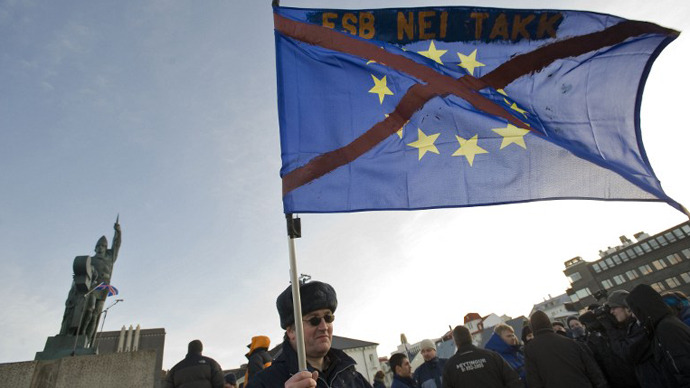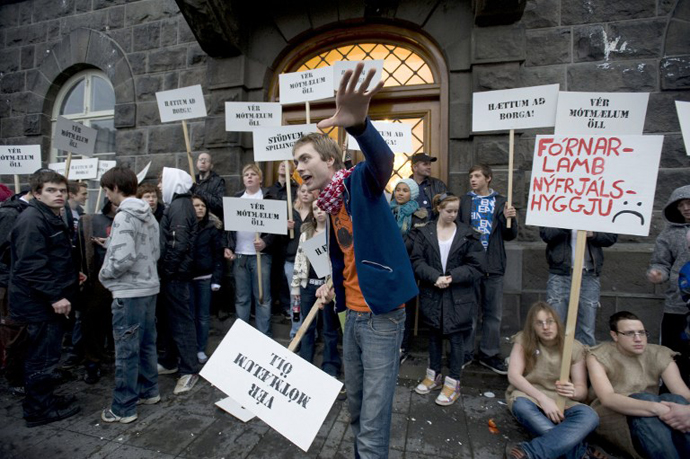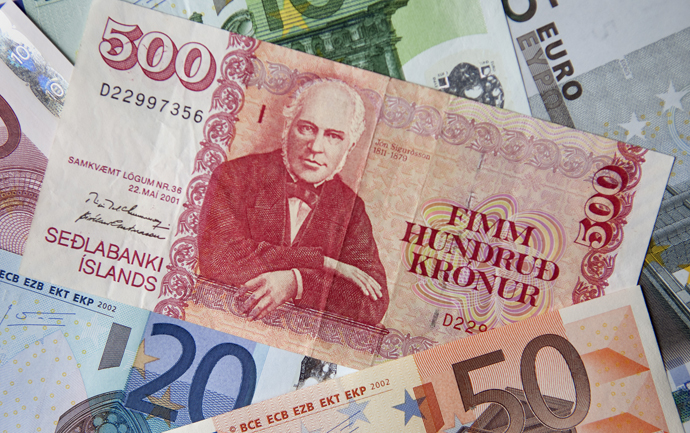‘EU won’t offer salvation for Iceland’ – debate

The future of Iceland’s EU bid is in question as the Euro-skeptical forces enter the parliamentary poll as hot favorites. The experts are split on the issue as some speak for isolation and other suggesting Iceland needs the European currency to cope.
Iceland applied to join the EU under current center-left
government in July 2009, with the formal negotiations beginning a
year later. But the talks are most likely to be stalled if the
center-right Independence and Progressive parties will take power
in the country after the Saturday’s vote.
Icelandic MP and founder of the Rainbow Party, Atli Gislason,
believes that Iceland will lose more than it’ll gain from becoming
a part of the European Union.
“We’re internationalists and would like to trade with all the
world, not only isolated Europe. It’s little part of the whole
world, not so little, but still a little one,” he told RT.
The Gislason stressed that even UK-proposed reform of the EU, aimed
at making the Union more flexible, won’t make him and his
colleagues in the Rainbow Party to change their mind.
“I think we’ll lose our independence [if Iceland joins the
EU],” the MP explained. “We’ll lose our influence in the
northern part of the Atlantics and we’ll not rule the fisheries and
resources. We’ll have only 23-mile fishing line, the EU will rule
everything else in their free market way, which I don’t
like.”
Iceland, which took a devastating blow in the 2008 economic crisis,
is widely seen as a recovery success story. The country has showed
steady economic growth and falling unemployment rates, but the
ruling center-left Social Democratic Alliance participate in
parliamentary election with zero chance of success.

“There are two sides on this,” Gislason said. “Banks
and money owners are happy, but families and homes aren’t. We have
more poverty now than four, five, six years ago. We have flats
going on auctions. Many people have lost their capitals and their
flats after the crisis. So the homes are having it bad and it’s the
main issue now in the election.”
Doctor Steven Mccabe from Birmingham City University also thinks
that Iceland’s comeback after the 2008 crisis would’ve been
impossibility if it was an EU member state.
“There was talk about the EU, but I think that’s out of the
question. They realized that their best stretch in for recovery is
to remain isolated or to be independent. Europe doesn’t offer
salvation,” he said.
“What Iceland does have is the fact that it’s on the edge of
the world. It’s an isolated nation and indeed is an island.”
“It effectively, as we say in the UK, stuck its fingers on the rest
of the world and said: we’re not giving you your money back. What
can you do, short of invading Iceland, which was never on the
agenda. It has been able to look at its own ends, look after
itself. For other European economies, such as Ireland, Portugal and
others – they’re much more interlinked in Europe. Iceland isn’t.
So, what it’s been able to do is reinventing the sort of things
it’s good at – its indigenous industries (fishing, farming,
aluminum smelting),” Mccabe added.
Iceland has no future without European currency
But not everybody sees the EU membership as a disadvantage for
Iceland, with Director of the Centre for European Studies at
Bifrost University, Eirikur Bergmann, saying that the European
currency is essential for the country to go with its economic
recovery.
“One of the main problems in the country is the currency,”
he said. “Even though the economy has turned around quite a bit,
there’s an underlying difficulty with operating such a small
currency like the Icelandic krona, which is only backed with
300,000 people and isn’t sustainable. Iceland is thus locked behind
capital controls and this distorts very much the economic growth in
this country. And Iceland desperately needs to break out of these
constrains. One was of doing that is to join in a stronger, bigger
currency. A currency that’s actually tradable abroad, which
Icelandic krona isn’t at the moment.”

“So, the EU question is really a question of sort of re-joining the international economy. But it depends very much on how it’ll be done and what sort of agreement Iceland could strike with the EU on accessing the Union and adopting the currency. This is the main underlying problems still unsolved in Iceland. That’s the problems of currency and debt burdens on ordinary households. If we can get those two out of the way, Iceland is heading for the remarkable recovery,” Bergmann, who was on the Assembly that revised the Icelandic constitution after major anti-crisis protests back in 2008, added.
Economics professor at the University of Iceland, Thorolfur Matthiason, has called the EU membership “a very complicated question”, but agreed that the country would, eventually, have to give up on the krona to insure economic stability in the future.
“You have to remember that Iceland is a very small nation. We
are only 320,000. So there are things that we will have problems
with,” he said. “And one of the biggest problems that we’ll
have in the future concerns our currency. We have tried to run a
free-floating currency in the smallest currency area in the world
for the Icelandic krona. And that was directly and indirectly the
cause for how big the banks got, eventually, in the collapse. There
are long-term considerations that are rather different from the
short considerations at this point of time.”
The statements, views and opinions expressed in this column are solely those of the author and do not necessarily represent those of RT.












